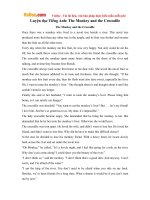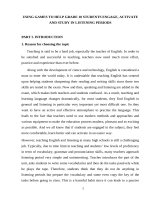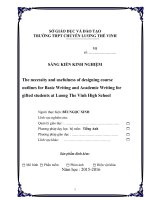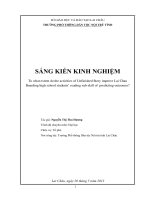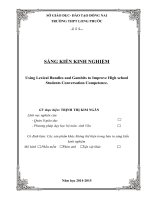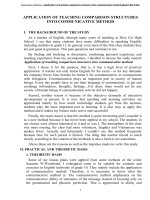skkn tiếng anh the necessity and usefulness of designing course outlines for basic writing and academic writing for gifted students at luong the vinh high school
Bạn đang xem bản rút gọn của tài liệu. Xem và tải ngay bản đầy đủ của tài liệu tại đây (238.24 KB, 26 trang )
SỞ GIÁO DỤC VÀ ĐÀO TẠO
TRƯỜNG THPT CHUYÊN LƯƠNG THẾ VINH
Mã
số: ................................
SÁNG KIẾN KINH NGHIỆM
The necessity and usefulness of designing course
outlines for Basic Writing and Academic Writing for
gifted students at Luong The Vinh High School
Người thực hiện: BÙI NGỌC XINH
Lĩnh vực nghiên cứu:
Quản lý giáo dục : …………………………………………
Phương pháp dạy học bộ môn: Tiếng Anh
Phương pháp giáo dục : …………………………………..
Lĩnh vực khác:
…………………………………..
Sản phẩm đính kèm:
Mô hình Phần mềm
Phim ảnh
Hiện vật khác
Năm học : 2015-2016
1
SƠ LƯỢC LÝ LỊCH KHOA HỌC
I. THÔNG TIN CHUNG VỀ CÁ NHÂN
1. Họ và tên: BÙI NGỌC XINH
2. Ngày tháng năm sinh: 21/07/1969
3. Giới tính: Nữ
4. Địa chỉ: 103/33 đường 30/4, phường Trung Dũng, Tp Biên Hòa, tỉnh
Đồng Nai.
5. Điện thoại: 0918.155005
6. E-mail:
7. Chức vụ: Tổ phó CM
8. Nhiệm vụ được giao : Giảng dạy môn Tiếng Anh cho 2 lớp 11 Anh 1
và 11 Anh 2
9. Đơn vị công tác: Trường THPT Chuyên Lương Thế Vinh
II. TRÌNH ĐỘ ĐÀO TẠO
- Học vị (hoặc trình độ chuyên môn, nghiệp vụ) cao nhất: Thạc sĩ
- Năm nhận bằng: 2007
III. KINH NGHIỆM KHOA HỌC
-
Số năm có kinh nghiệm: 24 năm
- Các sáng kiến kinh nghiệm đã có trong 5 năm gần đây:
1. The effectiveness of group work in teaching reading
2. Motivating students to practice listening skill through English songs
to decrease students’ tense while listening, make them feel more
interested in listening and enrich their vocabulary
3. How to help gifted students find essay writing easy and how to help
them write more effectively
4. How to help gifted students write essays dealing with “Describing
People” more effectively
5. Helping gifted students gain benefits from extensive reading
2
Title
The necessity and usefulness of designing course
outlines for Basic Writing and Academic Writing for
gifted students at Luong The Vinh High School
3
Title: The necessity and usefulness of designing course outlines for Basic Writing
and Academic Writing for gifted students at Luong The Vinh High School
I./ INTRODUCTION
Besides having to study the text book designed by Ministry of Education, gifted students
at Luong The Vinh High school have to learn a great number of other items ( e.g.
practical grammar points, idioms, phrasal verbs, etc. ) and polish up on the four skills
(Listening, Speaking, Reading and Writing). As a teacher, I realize that there is a must in
developing a course outline to help students achieve specific academic goals.
A course outline helps students know what they will learn, what they will obtain and
what they will have to do during the course, which enhances their collaborations with the
teacher.
A course outline contains detailed information about how to teach a course, discussion
questions, specific activities for learners and assessment methods.
This innovation focuses on the course outlines for Basic Writing and Academic Writing.
II./ RATIONALE OF THE STUDY
A. The importance of writing to gifted students / college students
Writing skill plays a very important role and gifted students / college students need good
writing skills as Oshima and Huge point out that “ The most important aspect of a
college education is to learn to communicate clearly and effectively. That is why general
college education prerequisites include a number of composition and reading courses that
you must complete before you graduate.”
4
B./ The importance and necessity of designing and producing a curriculum and a
course outline for students.
A curriculum usually contains a list of courses and learning objectives which
help learners know what they expect to learn in order to achieve specific academic goals.
And McGill.CA points out that, “Course outlines are intended to provide students with an
overall plan for a course to enable them to function efficiently and effectively in the
course.” (McGill.CA 2016: 3).
C. / The importance and necessity of designing and producing a course outline for
Writing ( Basic Writing & Academic Writing)
How to write well and effectively and meet the expectations of the readers is a major
concern for many students. So teachers should teach them how to write.
A course outline for writing makes teachers follow what they have planned to teach their
students and prevents teachers from neglecting to perform their duties. And McGill.CA
points out that, “A course outline is a document that benefits students and
instructors. It is an essential piece when designing any course. Writing it guides
the instructor’s development of the course.”
D ./ How to design a course outline:
According to McGill, “A course outline can be divided into 7 sections.”
1. General information
•
Number and title of course, number of credit
•
Name and title of the Instructor
•
Day, place and time of regular classes
•
•
Prerequisites - particular courses, specific knowledge or skills a student
should know before beginning the course (e.g., use of the computer, ability to
read architectural plans, etc.)
Calendar course description.
5
2. McGill Policy Statements
The following statement must be included in all course outlines.
We must value academic integrity. Therefore, all students must understand the
meaning and consequences of cheating, plagiarism and other academic offences under
the Code of Student Conduct and Disciplinary Procedures.
3. Learning outcomes
Course goals or objectives; clear statements of the knowledge, competencies or
skills you expect students to have acquired by the end of the course (e.g., "By the
end of this course students should be able to synthesize information from...." or
"make predictions" or "solve problems" etc.).
4. Course content
•
A description of the topics to be addressed in the course.
•
A concept map or graphic representation of the content of the course.
•
The rationale for the sequence of the course, especially if there is not an
assigned text in chapter sequence (e.g., an historical approach with topics
arranged chronologically, a progression from simple to more complex
procedures or concepts, or a series of theoretical principles followed by
applications).
•
If appropriate, explain what the course is not about or what topics
will not be covered.
5. Instructional method
•
Provide a brief description of instructional approaches that will be used
during the course (e.g., lectures, seminars, laboratory or clinical activities,
group projects, etc.).
6
•
All instructors are strongly encouraged to conduct mid-course
evaluations. Advising students of mid-course evaluations ahead of time will
likely lead to more constructive feedback.
6. Course materials (Textbooks and teaching aids)
•
Specific information should be provided about required texts, including
title, author(s), edition number and where they can be purchased or
borrowed.
•
Additional materials should be noted if they are part of the required
reading. (It should be clear what is required reading as opposed to suggested
reading).
•
Recommended readings should also be listed. It is helpful to the students
to indicate the relationship of each reading to a particular topic in the
course. This can be accomplished by grouping readings according to topic
and/or class session.
7. Assignments and evaluation (Assessment Methods)
•
A description of the means of evaluation to be used in the course.
A clear statement of what percentage of the final grade each assignment
and exam will represent.
●
●
The criteria and procedures for arriving at each contributing score.
The consequences of a delayed presentation or late paper. Are extensions
possible? What are acceptable circumstances for a delay? Are there penalties?
●
The topic or name of each assignment. Explicit information about
assignments (e.g., length, breadth) can also be provided as part of the course
outline, but this may be more easily provided later in the course, as assignments
are presented.
●
E /. The aim of the innovation:
7
- To let students know what they will learn and obtain at the course
- To teach gifted students some basic academic writing skills
- To help them write well and effectively
- To help them find essay writing easy
- To help them develop more confidence in their ability to write
- To help them show their skills in organising their ideas systematically
F./ The participants of the study
52 students of the two English classes (grade 11) of LTV high school were
chosen to take part in the innovation . The innovation was carried out in writing periods
of the two semesters of the school year.
The reason why the students of the two English classes (grade 11) were chosen as
the participants of the study were that:
-
They are gifted students.
-
They usually have to write essays.
-
They are interested in writing.
-
They often have to sit exams of English around the year.
III./ PROCEDURES
Learning to write well is a step-by-step process. As Oshima and Huge point out that
“ The ability to write is not a talent one is born with.”
“In writing, content is more important than mechanics, but mechanics is important too.”
( From the Course book : Teaching Reading & Writing – SEAMEO – page 104 )
COURSE OUTLINE 1:
BASIC WRITING
1. General information
- Title of course: Basic Writing
8
- To be applied to Semester 1 - English Class 11 - School year 2015-2016
- 2 periods / week (Every Monday afternoon)
2. Course Description
The course aims to enable students to develop and write good sentences and different
types of paragraphs. Students are given grammatical issues that are related to the kind of
writing being practiced. Also, various kinds of exercises help students avoid grammatical
mistakes and be able to produce logical and grammatically correct sentences. The course
acquaints students with the structure of a complete paragraph, which consists of a topic
sentence, supporting sentences and a concluding sentence. The course also covers
different types of paragraphs namely definition, process analysis, descriptive, opinion,
narrative and paragraphs in an essay that students have to master after finishing the
course.
3. Learning Outcomes
Upon the successful completion of the course, students will be able to:
1 Write grammatically correct sentences without common mistakes related to sentence
. structures and punctuation;
2. Work individually or in groups and share ideas through collaborative activities;
3
Edit the texts in writing assignments;
.
4. Write various kinds of paragraphs under time pressure; and
5.
Take advantage of the writing process to write a complete paragraph with cohesiveness
and coherence.
4. Course Content
Outline of Topics to be covered
Period
Topics
1
- Course introduction
References
Home/Class
assignments
Lesson 1:
Teacher will
distribute a set
of copies of
Rules :
9
Additional Grammar
Activities
a. Title Rules
Materials on
Grammar.
b. Capitalization Rules
c. Punctuation Rules
-Exercises on Capitalization and
2, 3 ,4,
Punctuation
Lesson 2 :
5,6 ,7,8,
The Basics of
9, 10,11,
Sentence Construction
12, 13,14
a. Phrases
Teacher will
distribute a set
of copies of
materials on
Grammar.
- Noun phrases
Activities
- Prepositional phrases
- Verbal phrases
- Appositive phrases
- Exercises on Phrases
b. Clauses
- Independent clauses
- Dependent clauses : 3 kinds of
dependent clauses
c. Sentence Structures
- Simple sentences
- Compound sentences
- Complex sentences
- Compound- complex sentence
d. Pronoun Usage
- Practice
e. Subject / Verb Agreement
- Practice
f. Parallelism
15
Additional Grammar
- Practice
g. Sentence Fragment And RunOn Sentences
- Practice : Sentence Correction
10
TEST 1 : Rules, The Basics of
Sentence Construction
16
Lesson 3 :
Teacher will
distribute a set
of copies of
materials.
Paragraph Structures
-What is a Paragraph?
- Example Paragraphs
-The Basic Elements of a Paragraph:
-Four Features of a Paragraph
17
Lesson 4 :
Developing Ideas for Writing a
Paragraph
Brainstorming
Teacher will
distribute a set
of copies of
materials.
Supplementary
Materials on
Grammar for
Further Practice on
Materials learned
Language Focus
18 ,19
Building Better Sentences
Lesson 5 :
Topic Sentences
-Features of a Good Topic Sentence
-How to write a Good Topic
Teacher will
distribute a set
of copies of
materials.
Additional exercises
Sentence
20, 21,23, Lesson 6 :
24
Supporting and Concluding
Sentences
- How to write Good Supporting
Sentences
-Kinds of Supporting Sentences
-Analyzing and Writing Supporting
Sentences
- How to write Good Concluding
Sentences
11
Teacher will
distribute a set
of copies of
materials.
Additional exercises
TEST 2 : Paragraph Structures
25
(Elements of a paragraph)
Lesson 7 :
Definition Paragraphs
- What is a Definition Paragraph?
- How to write a good definition
paragraph
26
Timed Writing # 1:
27
Teacher’s feed back on
Teacher will
distribute a set
of copies of
materials.
Homework Writing
Assignment #1:
Creative Writing
Assignment #1
28
Teacher will
distribute a set
of copies of
materials.
Lesson 8:
Process Analysis Paragraphs
- What is a Process Analysis
Homework Writing
Assignment #2:
Creative Writing
Paragraph?
- How to write a good Process
Analysis paragraph
Additional Topics for Writing
29
Teacher’s feed back on
Assignment #2
30
Lesson 9:
Teacher will
Descriptive Paragraphs
distribute a set
-What is a Descriptive Paragraph
of copies of
- How to write a good Descriptive
materials
paragraph
-Supplementary
Materials on
Grammar for
Further Practice on
Materials learned
-Homework Writing
-Assignment # 3 :
Descriptive
Paragraph Writing
31
Teacher’s feed back on
Assignment #3
12
32
33
34
Lesson 10 :
Teacher will
Assignment # 4 :
Opinion Paragraphs
distribute a set
Opinion Paragraph
- What is an Opinion Paragraph?
of copies of
Writing
- How to write a good Opinion
materials
Paragraph
Teacher’s feed back on
Assignment #4
Lesson 11:
Teacher will
Narrative Paragraphs
distribute a set
-Assignment # 5 :
of copies of
Narrative Paragraph
materials
Writing
- What is a Narrative Paragraph?
- How to write a good Opinion
Paragraph
35
Teacher’s feed back on
Assignment #5
36
Lesson 12:
Teacher will
Paragraphs in an Essay Putting it
distribute a set
All Together
of copies of
What does an Essay Look Like?
materials
Supplementary
Materials on
Grammar for
Further Practice on
Materials learned
An Essay Outline
The Thesis Statement
Supporting Ideas
Different Kinds of Essay
37
Organization
Final Test
5. Instructional method
Various methods are applied to to improve students’ knowledge, to promote students’
participation and collaboration in a supportive learning environment. Lectures
13
( activities that involve teacher-centred transmission models), discussions and taskbased activities ( student-centered constructivist models) will bring a variety of inputoutput procedures to reach the target of quality learning.
6. Course materials
Suggested Textbooks and Materials:
- Bailey,(2003). Academic Writing – A handbook for International Students- by Nelson
Thomas Ltd.
- Folse, K. S., Muchmore-Vokoun, A., & Solomon, E. V. (2010). Great writing 2: Great
paragraphs (3 edn). Heinle/Cengage Learning.
rd
- Folse, K. S.,Solomon E. V. & Palinkas B. S. (2008) Top 20 – Great grammar for great
writing (2 ed.). Heinle/Cengage Learning.
nd
- Boardman, A. C., & Frydemberg, J. (2002). Writing to Communicate (2 ed.),
nd
Longman.
- Hogue, A. (2001),. First Steps in Academic Writing, HCMC Publisher
- Oshima, A., & Hogue, A. (2002). Introduction to Academic Writing (2 ed.), McGrawnd
Hill.
- Pavlik, C., & Segal, K. M. (2007). Interaction Writing 1 & 2 (4 ed.), McGraw-Hill.
th
- Ruetten, K. M. (1986), Refining Composition Skills, Mac Millan - NewYork
7. Assignments and evaluation (Assessment Methods)
Assessment criteria for writing a paragraph:
Criteria
Percentage
1 The structure of a paragraph
30%
- consisting of basic elements: a topic sentence, supporting sentences
14
(details, examples etc.) and a concluding sentence (if necessary)
2 The content of a paragraph
- Being suitable for its kind
- Ideas: clear, comprehensible, logical
- Only one main idea for a paragraph
- Cohesiveness
- Coherence
3 - Lexical resource (spelling, good meaning,)
- Grammatical range and accuracy
- Sentence structure
- Punctuation
40%
30%
Below is a table of abbreviated letters teachers can use to point out mistakes when
marking students’ writing.
Symbol
Sp
VT
SV
Pl
Prep
WF
WW
WO
Punc
Pa
Frag
Art
C/U
SS
Meaning
Spelling
Verb tense
Sub-verb agreement
Plural
Preposition
Word form
Wrong word
Word order
Punctuation
Parallelism
Fragment
Article
Count /uncount Noun
Sentence structure
COURSE OUTLINE 2
ACADEMIC WRITING
1. General information
15
- Title of course : Academic Writing
- To be applied to Semester 2 - English Class 11 - School year 2015-2016
- 2 periods/week (Every Monday afternoon)
2.Course Description
Upon completing the course on Basic writing, students are instructed to improve their
accuracy and fluency in writing together with their ability to develop academic writing.
The purpose of this course is to help students understand the structure of a paragraph and
components of an essay. Students are introduced to practical and efficient approaches to
acquire the skills, strategies, and knowledge that are very necessary for academic writing
especially for writing various kinds of essays such as Comparison and Contrast, Cause
and Effect, Argumentative, Descriptive etc.
3a . Course Objectives
Course Objectives
The main goal of this course is to:
Equip students with a complete review of paragraphs and show how they are similar
1.
to short essay structures;
No.
2. Help students to sharpen their ability to write essays effectively;
Acquaint students with the elements that affect the quality of a written product such
as grammar, vocabulary, organization as well as coherence and cohesiveness;
4. Give students many chances for practicing peer-editing;
3.
5. Develop students’ ability to respond in writing to materials read independently;
Improve students’ ability to generate language, synthesize and compile ideas from
6.
different materials.
3b . Learning Outcomes
Learning Outcomes
Upon successful completion of this course, the student will be able to:
1. Understand and analyze authentic essays to improve the language and concepts and to
No.
16
enrich vocabulary needed for their own essays;
Know how to use vocabulary precisely and to produce a variety of sentence patterns /
2. structures in order to express ideas in acceptable and comprehensible academic
English;
3. Take advantage of the writing outlines to produce their own pieces of writing;
Know how to make use of writing skills such as using transitional expressions in
order to connect ideas in essays coherently and cohesively ;
5. Know how to make an outline or edit texts in written assignments;
4
Work in pairs or groups and exchange ideas through collaborative peer-editing
activities;
6 Write well-written essays under time pressure;
6
7 Produce various types of essays.
4. Course content
Outline of Topics to be covered
Period
Topics
References
Home/Class
assignments
1
2, 3
Introduction to the Course
Teacher will
Review of previous knowledge –
distribute hand-
paragraphs, coherence, cohesion
outs for review
Lesson 1
Essay Structure
Teacher will
The Basics of Essay Structure
distribute a set of
- Introduction
copies of materials
*The basic purpose of the
introduction:
. How to produce General
Statement
. How to produce Thesis
Statement
- Body
What includes in the body of an
17
Supplementary
Materials for
Further Practice on
Materials learned
essay?
- Conclusion
The purpose of the conclusion
- Practice on writing thesis
statements on given topics
- Sample essays
4,5
Lesson 2
Supplementary
Materials for
Further Practice on
Materials learned
Editing and Revision
- Step 1: Correct all mechanical
errors.
- Step 2: Check your supporting
ideas
-Step3: Check the sophistication
and variety of your grammar and
6
vocabulary
Lesson 3
Introduction to Different types
Teacher will
of essays
distribute a set of
- Descriptive Essays
copies of materials
- Comparison Essays
- Cause- effect Essays
- Classification Essays
- Argumentative Essays
- Expository Essays
7,8
- Narrative Essays
Lesson 4
Descriptive Essays
Teacher will
1. Describing people
distribute a set of
- Words and expressions for copies of materials
describing a person’s physical
appearance
18
-Essay outline 1
- Composition skills
- Original Student
Essay 1
2. Describing places
- Language material
- Composition skills
9
Teacher’s feed back on Original
Student Essay 1
10, 11
Lesson 5
Comparison Essays
- Focus on Organization
- Making an outline
Teacher will
Essay outline 2
distribute a set of
copies of materials
Suggested topic: Fruits vs.
Vegetables
- Original Student
Essay 2 Suggested
topics :
- Public vs. Private
Transportation
- Connectives and transitional
-Go on vacation vs
Stay at home
phrases
- Language focus : comparatives,
Superlatives, and Parallel
Structures
12
Teacher’s feed back on Original
Student Essay 2
13, 14
Lesson 6
Cause- Effect Essays
Teacher will
- Organization
distribute a set of
- Supporting details
copies of materials
- Brainstorming and outline
practice
Essay outline 3
- Original Student
Essay 3
Suggested topic:
Why so few students
Suggested topic: What are the
read newspapers?
causes of poor water quality for
many people around the world?
-Connectives and transitional
phrases
19
15
- Sample essays
Teacher’s feed back on Original
Student Essay 3
16 ,17
Lesson 7
Teacher will
Classification Essays
distribute a set of
- Organization
copies of materials
- Supporting details
- Brainstorming and outline
practice
Suggested topic:
- Essay outline 4
- Original Student
Essay 4
Suggested topics :
Methods of studying
. Reason for attending (or not
for a final exam
attending) university
18
- Sample essays
Teacher’s feed back on Original
Student Essay 4
19 , 20
Lesson 8
Teacher will
Argumentative Essays
distribute a set of
- Organization:
copies of materials
A General Plan for the Whole
Argumentative Essay
- Counterargument and
Refutation
- Outlining
- Original Student
Essay 5
Suggested topics :
Is there too much
pressure on
- Connectives and transitional
teenagers to go to
phrases
college?
- Words and Expressions to
Describe Some Basic Concepts
- Suggested topic :
Should cigarettes and other
tobacco products be outlawed.
21
- Essay outline 5
- Sample essays
Teacher’s feed back on Original
Student Essay 5
20
22, 23
Lesson 9
Expository Essays
Teacher will
- Organization :
distribute a set of
A
General
Plan
for
an copies of materials
Expository Essay.
- Exposition Texts for Study
Pretend you will live
Pretend that you are a traveler.
till 100 years of age.
Which country would you return
Describe what the
to?
world will be like
- Sample essays
Teacher’s feed back on Original
Student Essay 6
25, 26
Lesson 10
when you turn 100.
Narrative essays
Teacher will
- Organization
distribute a set of
- Story for Study
copies of materials
-Basic Descriptive and Narrative
- Original Student
Essay 7
Suggested topic:
embarrassing that
- Time and tense in a Narration
happened to you.
- Transitional phrases :
Spatial Order
Suggested topic:
Your most exciting moment
playing sports.
- Sample essays
Teacher’s feed back on Original
Student Essay 7
Writing on topics of
TESTS
- Essay outline 7
Something
Skills
27
- Original Student
Essay 6
Suggested topic:
Suggested topic:
24
- Essay outline 6
different types of
21
essays
5. Instructional method
Various methods are applied to to improve students’ knowledge, to promote students’
participation and collaboration in a supportive learning environment. Lectures
( activities that involve teacher-centred transmission models), discussions and taskbased activities ( student-centered constructivist models) will bring a variety of inputoutput procedures to reach the target of quality learning.
6. Course materials : Textbooks and teaching aids:
Suggested Course Materials:
- Bailey,(2003). Academic Writing – A handbook for International Students. by Nelson
Thomas Ltd.
- Oshima, A., & Hogue, A. (2006). Writing academic English (4 ed.). (The Longman
th
Academic Series, Level 4). USA: Longman.
- Oshima, A. (1997). An introduction to writing academic English. USA: Longman.
- Soles, D. (2007). The Essentials of Academic Writing. USA: Longman.
7. Assessment Methods:
a./ Task description:
Students are asked to write an essay at time allowed ( 60 minutes) in class. The topics
will be on the essay types that students have learned from lesson 2 to lesson 10
(descriptive, comparison, and cause and effect essays etc.)
b./ Assessment criteria
-Task achievement : Organization (30%)
Structural integrity: opening, paragraph construction, closing
-Content: ( 40%)
Main ideas
Reasoning
22
Coherence and cohesion (Paragraphs are clear, logical and organized. Good use of
transition words; firstly, secondly, therefore etc.)
- Lexical resource , Grammatical range and accuracy : 30%
Word choice, comprehensibility, sentence construction, grammar and mechanics
-Below is a table of abbreviated letters teachers can use to point out mistakes when
marking students’ writing.
Symbol
Sp
VT
SV
Pl
Prep
WF
WW
WO
Punc
Pa
Frag
Art
C/U
SS
Meaning
Spelling
Verb tense
Sub-verb agreement
Plural
Preposition
Word form
Wrong word
Word order
Punctuation
Parallelism
Fragment
Article
Count /uncount Noun
Sentence structure
IV. / FINDINGDS
Questionnaire
Students are required to give feedback on the following question.
What did you think about the course outlines on Basic
Writing and Academic Writing the teacher gave you?
A./
23
Statements
1
SA
1. The course outline is useful
resources that you can consult
87 %
throughout the duration of the
course.
2. The course outline contains a
number of important clues about
65%
what your teacher expects you to
learn during the course.
3. The course outline contains
information about the structure of 67 %
the course and its requirements.
4. The course outline is like a
roadmap with directions for
12 %
succeeding in the class
5. You gain more confidence in
56 %
writing
2
A
3
N
5%
4%
19 %
16 %
25 %
8%
56 %
21 %
21%
23%
4
D
5
SD
11 %
B./ Other comments
………………………………………………………………………………………………………………………………………………………………
…………………………………………………………………………………………………
V./ CONCLUSION
In teaching, the creating of a course outline or a course syllabus is very necessary.
It keeps both teachers and students aware of all aspects of the course and prevents
any surprises throughout the semester. The course syllabus functions as a roadmap
with directions for succeeding in the class. In order to help gifted students to achieve
their purpose and to help gifted students write well and more effectively, we should /
must develop a well-organized course outline and follow it strictly. Students will
become more motivated if learning materials and teachers’ way of teaching meet their
expectations, needs, abilities and interests.
The writer of this piece of writing
24
Bùi Ngọc Xinh
VI. / REFERENCES
- Bailey, (2003). Academic Writing – A handbook for International Students
- Morley –Warner, T. 2000. Academic Writing is . . . . CREA Publications.
- McGill. CA, Teaching and Learning Services, Teaching McGill @/ Course
Preparation and Design
- Oshima, A. & Hogue, A. 1997. Introduction to Academic Writing. Addison
Wesley Longman.
- Insider Writing – 2006-2007 LinguaForum, Inc
- The
Course booklet. Teaching Reading and Writing. Regional
Centre Singapore.
25
Language


